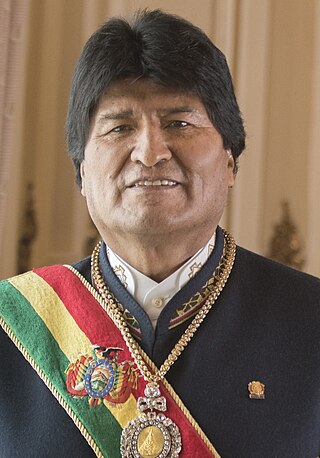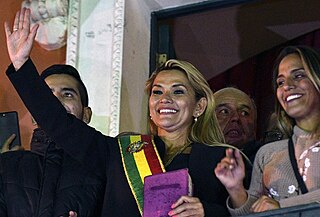Related Research Articles

Juan Evo Morales Ayma is a Bolivian politician, trade union organizer, and former cocalero activist who served as the 65th president of Bolivia from 2006 to 2019. Widely regarded as the country's first president to come from its indigenous population, his administration focused on the implementation of left-wing policies, improving the legal rights and socioeconomic conditions of Bolivia's previously-marginalized indigenous population and combating the political influence of the United States and resource-extracting multinational corporations. Ideologically a socialist, he has led the Movement for Socialism (MAS) party since 1998.

Human rights in Cuba are under the scrutiny of Western human rights organizations, which accuse the Cuban government of committing systematic human rights abuses against the Cuban people, including arbitrary imprisonment and unfair trials. International human rights organizations such as Amnesty International and Human Rights Watch have drawn attention to the actions of the human rights movement and designated members of it as prisoners of conscience, such as Óscar Elías Biscet. In addition, the International Committee for Democracy in Cuba led by former statesmen Václav Havel of the Czech Republic, José María Aznar of Spain and Patricio Aylwin of Chile was created to support the "civic movement".

Oswaldo Payá Sardiñas was a Cuban political activist. A Roman Catholic, he founded the Christian Liberation Movement in 1987 to oppose the one-party rule of the Cuban Communist Party. He attracted international attention for organizing a petition drive known as the Varela Project, in which 25,000 signatories petitioned the Cuban government to guarantee freedom of speech and freedom of assembly as well as to institute a multi-party democracy. In recognition of his work, he received the European Parliament's Sakharov Prize and People in Need's Homo Homini Award.

The Cuban dissident movement is a political movement in Cuba whose aim is to replace the current government with a liberal democracy. According to Human Rights Watch, the Cuban government represses nearly all forms of political dissent.

Óscar Elías Biscet González is a Cuban physician and an advocate for human rights and democratic freedoms in Cuba. He is also the founder of the Lawton Foundation.
Armando Valladares Perez is a Cuban-American poet, diplomat and former political prisoner for his involvement in the Cuban dissident movement.

Pedro Luis Boitel was a Cuban poet and dissident who opposed the governments of both Fulgencio Batista and Fidel Castro. In 1961, he was sentenced to 10 years in prison.
The 2006–2008 Cuban transfer of presidential duties was the handover of the title of president and presidential duties from longtime Cuban leader Fidel Castro to his brother Raúl Castro, the next-in-line-of-succession person in Cuba, following Fidel's operation and recovery from an undisclosed digestive illness believed to be diverticulitis. Although Raúl Castro exercised the duties of president, Fidel Castro retained the title of President of the Council of State of Cuba and President of the Council of Ministers of Cuba, during this period.

The Human Rights Foundation (HRF) is a non-profit organization that focuses on promoting and protecting human rights globally, with an emphasis on closed societies. HRF organizes the Oslo Freedom Forum. The Human Rights Foundation was founded in 2005 by Thor Halvorssen Mendoza, a Venezuelan film producer and human rights advocate. The current chairman is Russian chess grandmaster Garry Kasparov, and Javier El-Hage is the current chief legal officer. The foundation's head office is in the Empire State Building in New York City.
Sebastian Arcos Bergnes was a Cuban human rights activist. A prominent Cuban dissident, he was openly adversarial to the dictatorships of Fidel Castro and Fulgencio Batista.

Bolivia–United States relations were established in 1837 with the first ambassadorial visit from the United States to Peru–Bolivian Confederation. The Confederation dissolved in 1839, and bilateral relations did not occur until 1848 when the United States recognized Bolivia as a sovereign state and appointed John Appleton as the Chargé d'Affaires.
Events from the year 2007 in Bolivia

The foreign policy of the Evo Morales administration concerns the policy initiatives made towards other states by the former President of Bolivia, in difference to past, or future, Bolivian foreign policy. Morales' foreign policy can be roughly divided between that of the Americas and the rest of the world.

Guillermo Fariñas Hernández is a Cuban doctor of psychology, independent journalist and political dissident in Cuba. He has conducted 23 hunger strikes over the years to protest various elements of the Cuban government and spent more than 11 years in prison. He vowed that he would die in the struggle against censorship in Cuba.
Orlando Zapata Tamayo was a Cuban political activist and a political prisoner who died after hunger striking for more than 80 days. His death received international attention, and was viewed as a significant setback in Cuba's relationship with the U.S. the EU and the rest of the world.
Yndamiro Restano Díaz is a Cuban dissident journalist and poet who has won the 1996 Golden Pen of Freedom Award of the World Association of Newspapers and a 1994 International Press Freedom Award from the Committee to Protect Journalists. In 1995, the South Florida Sun-Sentinel described him as "Cuba's leading dissident journalist".

Normando Hernández González is a Cuban writer and journalist who now lives in the United States.

Bolivia–Cuba relations refers to the diplomatic relations between Bolivia and Cuba. Both nations are members of the United Nations, but relations of Bolivia with Cuba, like those of most countries in the Western Hemisphere with the notable exceptions of Canada and Mexico, have waxed and waned over the decades depending on geopolitical and regional political circumstances. Relations were good under Evo Morales, who shared the position of his like-minded left-wing allies in Nicaragua and Venezuela that Fidel Castro was a humanist and beloved icon of resistance to US hegemony in the Americas.

A political crisis occurred in Bolivia on 10 November 2019, after 21 days of civil protests following the disputed 2019 Bolivian general election in which incumbent President Evo Morales was initially declared the winner. The elections took place after a referendum to amend the Bolivian constitution, which limits the number of terms to two, was rejected in 2016. In 2017 under political pressure and a legal demand from the Morales government, the Constitutional Tribunal (TCP) ruled that all public offices would have no term limits despite what was established in the constitution and allowing Evo Morales to run for a fourth term.
The following is a list of reactions to the 2019 Bolivian political crisis.
References
- 1 2 3 4 5 6 "Human Rights Foundation - Amauris Samartino: Bolivian Resident Expelled for Criticizing Fidel Castro and Evo Morales". Thehrf.org. Archived from the original on 2012-03-12. Retrieved 2012-05-23.
- 1 2 3 4 5 6 "Human Rights Foundation - Dissident Expelled from Bolivia Granted Asylum in Norway; Norway becomes a safe haven for Amauris Samartino after illegal detention". Thehrf.org. Archived from the original on 2012-03-12. Retrieved 2012-05-23.
- 1 2 3 "Expulsan a cubano que hizo denuncias contra el régimen de Morales". Bolivia.diariocritico.com. 2006-12-25. Archived from the original on 2013-01-21. Retrieved 2012-05-23.
- ↑ "Amauris Samartino: Una víctima política - 20061230". Caracol.com.co. Archived from the original on 2013-01-01. Retrieved 2012-05-23.
- 1 2 3 Original TextMichael Ceaser. "Cuban doctors working abroad defect to the USA". The Lancet. Retrieved 2012-05-23.
- ↑ "El Negocio de ser la Victima". Partidorepublicanodecuba.org. Archived from the original on 2016-03-06. Retrieved 2012-05-23.
- ↑ "Cubano Amauris Samartino será deportado a Colombia". Nacional. El Mundo. Archived from the original on 2007-01-25. Retrieved 2013-02-03.
- 1 2 "Noticias EL DIARIO - Primera página". Eldiario.net. Retrieved 2012-05-23.
- ↑ "Carta abierta de Amauris Samartino". alminuto.com.bo. Archived from the original on 2016-03-04. Retrieved 2012-05-23.
- ↑ "Bak fasaden er det kun elendighet - Verden - NRK Nyheter". Nrk.no. 2011-01-30. Retrieved 2012-05-23.